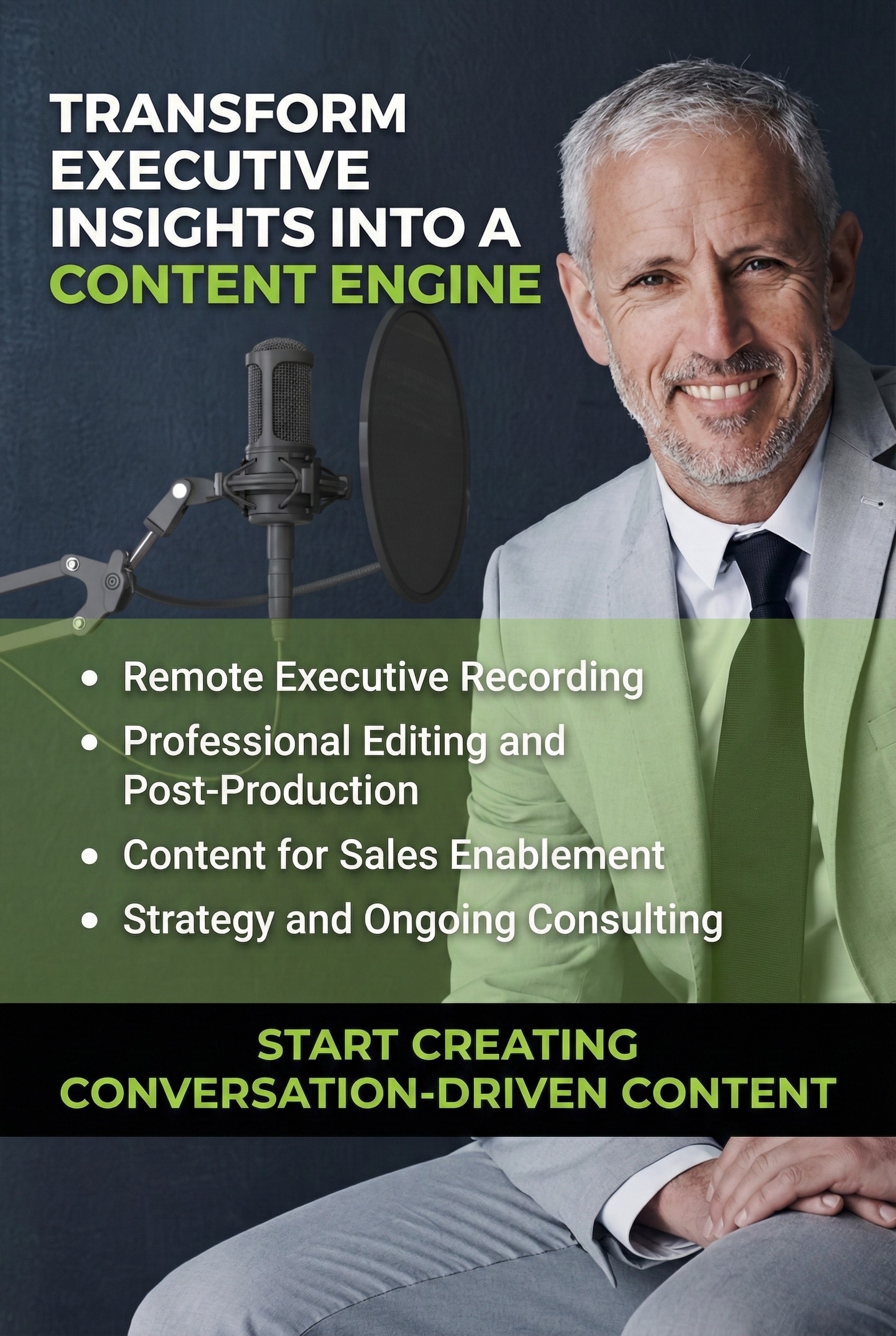How do you choose a podcast production company that can provide turn-key podcast production service? There are many benefits of starting your own business podcast and you’ve got a great idea for a podcast and lots of great content. Fortunately, there are experts who are ready to help you on the execution side.
A lot goes into producing a quality podcast, from equipment, recording space, and editing to a hosting service, and a comprehensive marketing strategy. If you are on the lookout for a good podcast production company, here are some of the questions that you would want to ask before making a decision.
Who Records the Podcast Audio?
Too often when a podcast production company refers to “Podcast Production” they are only talking about the part that happens once they get the audio from you. One of the first questions you need to ask is whether the company will assist in recording the audio or request for you to supply the original recording.
Keep in mind that podcast recording can happen in multiple ways. It can be captured locally in your location, in a studio, or done remotely using a combination of the two over the internet or phone. If your podcast will feature more than one person, be it a co-host or a guest, there will be times when it won’t be possible to record in the same room.
Recording podcast content locally is always the superior choice because it will provide the best audio quality and better overall chemistry between the interviewer and interviewee. Remote recording, on the other hand, will give you access to interesting guests and thought leaders that wouldn’t otherwise be able to make it on your podcast.
Getting the best of both worlds means that the podcast production company is capable of recording remotely – while at the same time obtaining near-studio quality podcast sound. This can be done by using a minimal amount of equipment on the speaker’s side while the producer uses Voice Over IP (VoIP) platforms such as Riverside.fm to capture clean audio.
The main benefit of this is that they record the audio locally for each person. Therefore, even if there are internet connection issues, the audio quality will remain high.
A secondary, though not optimal option is remote recording using Skype. The benefits of Skype is that it’s familiar, it’s easy to use, and it allows you to see each other.
On the downside, the sound quality isn’t always good – which is influenced largely by the guest’s internet connection. And obviously, a poor-quality sound will have a negative effect on your podcast’s popularity.
A third option of course is to record the audio yourself. While recording a podcast can be as simple as using a phone app, this isn’t ideal for a business due to limitations on sound quality and overall production. This means that you’ll need to invest in equipment to get a professional sound, so next let’s talk about equipment.
Will You Be Required to Purchase Podcasting Equipment?
If the podcast production company that you choose to work with has a local studio or if they can bring a studio to you (yes, that is a very viable option) then all you have to do is show up with the topic and the voice. Reputable producers can even patch in remote podcast guests using VoIP and phone connections, saving you the cost or hassle of trying to figure out the equipment needed to handle multiple remote speakers.
If you are looking to start recording on your own without a producer or production partner you’ll need to invest in some recording equipment. The amount of equipment that you will need will depend on the number of guests you expect to have as well as the environment that you record in.
It’s true that you can use your laptop’s microphone or your phone, but you’ll soon learn that the quality won’t allow you to compete on a professional level. When you begin to take phone calls and have multiple guests, it gets complicated quickly. This is when you definitely want to work with a professional podcast production company.
To take phone calls on your podcast, you will need equipment that is able to record phone calls clearly without providing feedback loops to the caller. This can be a quite technical feat and embarrassing if you have a high-end guest on the line.
For the best results, you should invest in some local recording equipment that’s able to minimize or eliminate any background noise, facilitate guests, allow guests to hear clearly, and allow for post-editing after the recording is done.
For a single person podcast, this investment doesn’t have to be high. Typically, a good USB mic and headphones will do.
We’ve put together a couple of Starter Podcast Kits that are more than capable of getting the job done with a minimal investment. Even if you plan to have a remote producer, having a simple setup connected to your laptop is a good investment for capturing audio.
What Kind of Podcast Post-Production Are They Capable Of?
Most podcast production companies only do post-production, meaning that you send them audio that you recorded and they produce it into a show. You want to be sure that even if they don’t help you record the audio, they have the capabilities to help you polish your audio and add any other show elements such as an Intro, Outro, Segues, or sound effects.
Post-production podcast editing can be a somewhat complex and tedious task. This is particularly true if your equipment and software aren’t performing, or if your guests aren’t comfortable with public speaking.
Becoming tongue-tied, shuttering, taking long pauses, and having too many false starts are but a few of the distractions that disrupt the listener’s experience. Some podcasters may, indeed, prefer not to edit their podcast, leaving it “authentic.” Yet, this can make listening to the podcast pretty hard or even unbearable.
However, if the post-production is done right, people won’t even notice that there’s been some editing. The whole point of the process is to remove anything that may be distracting to your listeners so that the conversation will flow naturally. Therefore, your podcast production company should be able to clean up your audio quality if there are issues, as well as remove any pauses and “umm” moments.
Likewise, it would be a good idea to choose a podcast production company that can also produce your intro and outro segments. Quality intros and outros will help your podcast gain instant credibility with listeners. The intro will grab people’s attention and build excitement for the upcoming episode.
The outro will wrap everything nicely, letting you bid farewell, as well as subtly hinting at your listeners to take further action. Believe it or not, there is a formula and science behind creating a good intro so don’t take the creation of this part of your podcast lightly.
Will They Distribute Your Podcast to All of the Major Listening Platforms?
A successful podcast will also involve comprehensive distribution across all major podcast platforms. Your podcast production company should be able to assist in making sure that your show is formatted correctly and distributed.
The major podcast platforms at the moment are iTunes, Spotify, Google Podcasts, CastBox, Stitcher, iPodder, TuneIn, Blubrry, PodBean, RadioPublic, Audioboom, Soundcloud, and even YouTube. Your podcast production partner should distribute your podcast on all the major platforms and not limit themselves only to iTunes.
Granted, the majority of podcast listeners use iTunes or Google Podcasts (because both come pre-installed on Apple and Android phones respectively), this is by no means the only place where podcasts are being consumed. Having your podcast featured on these platforms should go without saying, but you should also consider having it on the other platforms as well.
Will They Help to Market and Promote Your Podcast?
Aside from distribution, there’s also the matter of marketing your podcast. There are plenty of promotion strategies that will help you get your podcast in front of your target audience. Social media obviously plays a key role. There are also many other promotional techniques including:
- Audiograms – short animated video clips with podcast audio
- Search engine optimization (SEO) – Paying attention to the words used both in speech and in meta tags
- Connecting with other podcasters to promote each other’s podcasts
- Attending live events and conferences (where you can also collect audio)
- Printed materials and email signatures
- Guest co-promotion – using your guest’s own following
- Word-of-mouth advertising
and the list goes on…
You can have the best production and content to match, but if your audience doesn’t know about it, all of your efforts will be in vain. A well thought out and implemented promotional strategy is crucial to your podcast’s success, and your partner should help you out.
Conclusion
Much goes into the production of a podcast, so choosing a podcast production company that can provide the extent of service that you need is essential. Personal, one-person podcasts can be done on your own with minimal equipment, however, when looking to produce a professional sounding and well-marketed podcast, it is best to look to professional podcast producers.
There is also a lot to consider beyond just equipment and production that full-service podcast production companies like Content Monsta can provide.
Want to learn more? Talk to a professional Content Monsta and start your podcast production journey today!
- How the READY Framework Turns Content Into Sales Enablement That Drives RevenueIf you’ve ever created polished marketing content and watched it fall …
- The SAUCE Framework For Better Content MarketingMy niece has been one to keep a hot sauce bottle …
- Building a Content Engine for Your CompanyIf you’re creating content for business and not seeing results, it’s …







